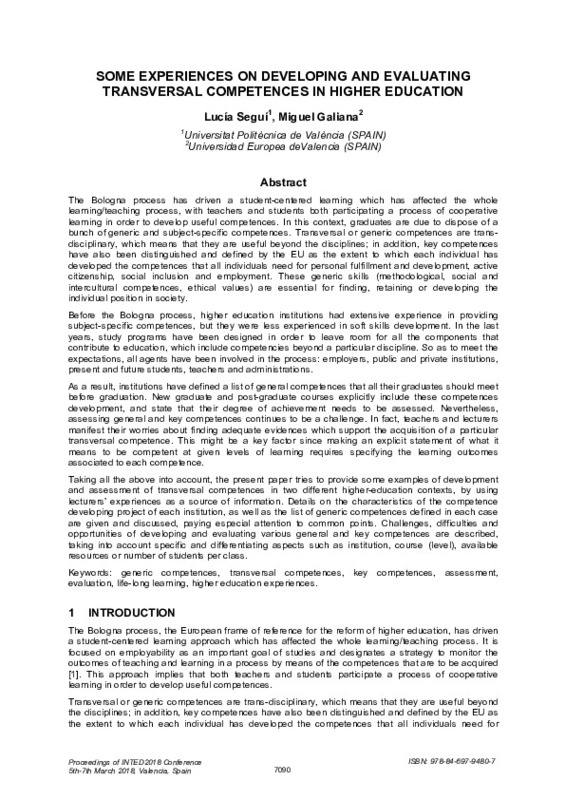JavaScript is disabled for your browser. Some features of this site may not work without it.
Buscar en RiuNet
Listar
Mi cuenta
Estadísticas
Ayuda RiuNet
Admin. UPV
Some Experiences On Developing And Evaluating Transversal Competences In Higher Education
Mostrar el registro sencillo del ítem
Ficheros en el ítem
| dc.contributor.author | Seguí Gil, Lucía
|
es_ES |
| dc.contributor.author | Galiana Martínez, Miguel
|
es_ES |
| dc.date.accessioned | 2024-02-09T06:54:00Z | |
| dc.date.available | 2024-02-09T06:54:00Z | |
| dc.date.issued | 2018-03-07 | es_ES |
| dc.identifier.isbn | 978-84-697-9480-7 | es_ES |
| dc.identifier.issn | 2340-1079 | es_ES |
| dc.identifier.uri | http://hdl.handle.net/10251/202483 | |
| dc.description.abstract | [EN] The Bologna process has driven a student-centered learning which has affected the whole learning/teaching process, with teachers and students both participating a process of cooperative learning in order to develop useful competences. In this context, graduates are due to dispose of a bunch of generic and subject-specific competences. Transversal or generic competences are transdisciplinary, which means that they are useful beyond the disciplines; in addition, key competences have also been distinguished and defined by the EU as the extent to which each individual has developed the competences that all individuals need for personal fulfillment and development, active citizenship, social inclusion and employment. These generic skills (methodological, social and intercultural competences, ethical values) are essential for finding, retaining or developing the individual position in society. Before the Bologna process, higher education institutions had extensive experience in providing subject-specific competences, but they were less experienced in soft skills development. In the last years, study programs have been designed in order to leave room for all the components that contribute to education, which include competencies beyond a particular discipline. So as to meet the expectations, all agents have been involved in the process: employers, public and private institutions, present and future students, teachers and administrations. As a result, institutions have defined a list of general competences that all their graduates should meet before graduation. New graduate and post-graduate courses explicitly include these competences development, and state that their degree of achievement needs to be assessed. Nevertheless, assessing general and key competences continues to be a challenge. In fact, teachers and lecturers manifest their worries about finding adequate evidences which support the acquisition of a particular transversal competence. This might be a key factor since making an explicit statement of what it means to be competent at given levels of learning requires specifying the learning outcomes associated to each competence. Taking all the above into account, the present paper tries to provide some examples of development and assessment of transversal competences in two different higher-education contexts, by using lecturers¿ experiences as a source of information. Details on the characteristics of the competence developing project of each institution, as well as the list of generic competences defined in each case are given and discussed, paying especial attention to common points. Challenges, difficulties and opportunities of developing and evaluating various general and key competences are described, taking into account specific and differentiating aspects such as institution, course (level), available resources or number of students per class. | es_ES |
| dc.language | Inglés | es_ES |
| dc.publisher | IATED | es_ES |
| dc.relation.ispartof | INTED2018 Proceedings | es_ES |
| dc.rights | Reserva de todos los derechos | es_ES |
| dc.subject | Generic competences | es_ES |
| dc.subject | Transversal competences | es_ES |
| dc.subject | Key competences | es_ES |
| dc.subject | Assessment | es_ES |
| dc.subject | Evaluation | es_ES |
| dc.subject | Life-long learning | es_ES |
| dc.subject | Higher education experiences | es_ES |
| dc.subject.classification | TECNOLOGIA DE ALIMENTOS | es_ES |
| dc.title | Some Experiences On Developing And Evaluating Transversal Competences In Higher Education | es_ES |
| dc.type | Comunicación en congreso | es_ES |
| dc.type | Artículo | es_ES |
| dc.type | Capítulo de libro | es_ES |
| dc.identifier.doi | 10.21125/inted.2018.1657 | es_ES |
| dc.rights.accessRights | Abierto | es_ES |
| dc.contributor.affiliation | Universitat Politècnica de València. Escuela Técnica Superior de Ingeniería Agronómica y del Medio Natural - Escola Tècnica Superior d'Enginyeria Agronòmica i del Medi Natural | es_ES |
| dc.description.bibliographicCitation | Seguí Gil, L.; Galiana Martínez, M. (2018). Some Experiences On Developing And Evaluating Transversal Competences In Higher Education. IATED. 7090-7098. https://doi.org/10.21125/inted.2018.1657 | es_ES |
| dc.description.accrualMethod | S | es_ES |
| dc.relation.conferencename | 12th International Technology, Education and Development Conference (INTED 2018) | es_ES |
| dc.relation.conferencedate | Marzo 05-07,2018 | es_ES |
| dc.relation.conferenceplace | Valencia, Spain | es_ES |
| dc.relation.publisherversion | https://library.iated.org/view/SEGUI2018SOM?re=downloadnotallowed | es_ES |
| dc.description.upvformatpinicio | 7090 | es_ES |
| dc.description.upvformatpfin | 7098 | es_ES |
| dc.type.version | info:eu-repo/semantics/publishedVersion | es_ES |
| dc.relation.pasarela | S\355515 | es_ES |








